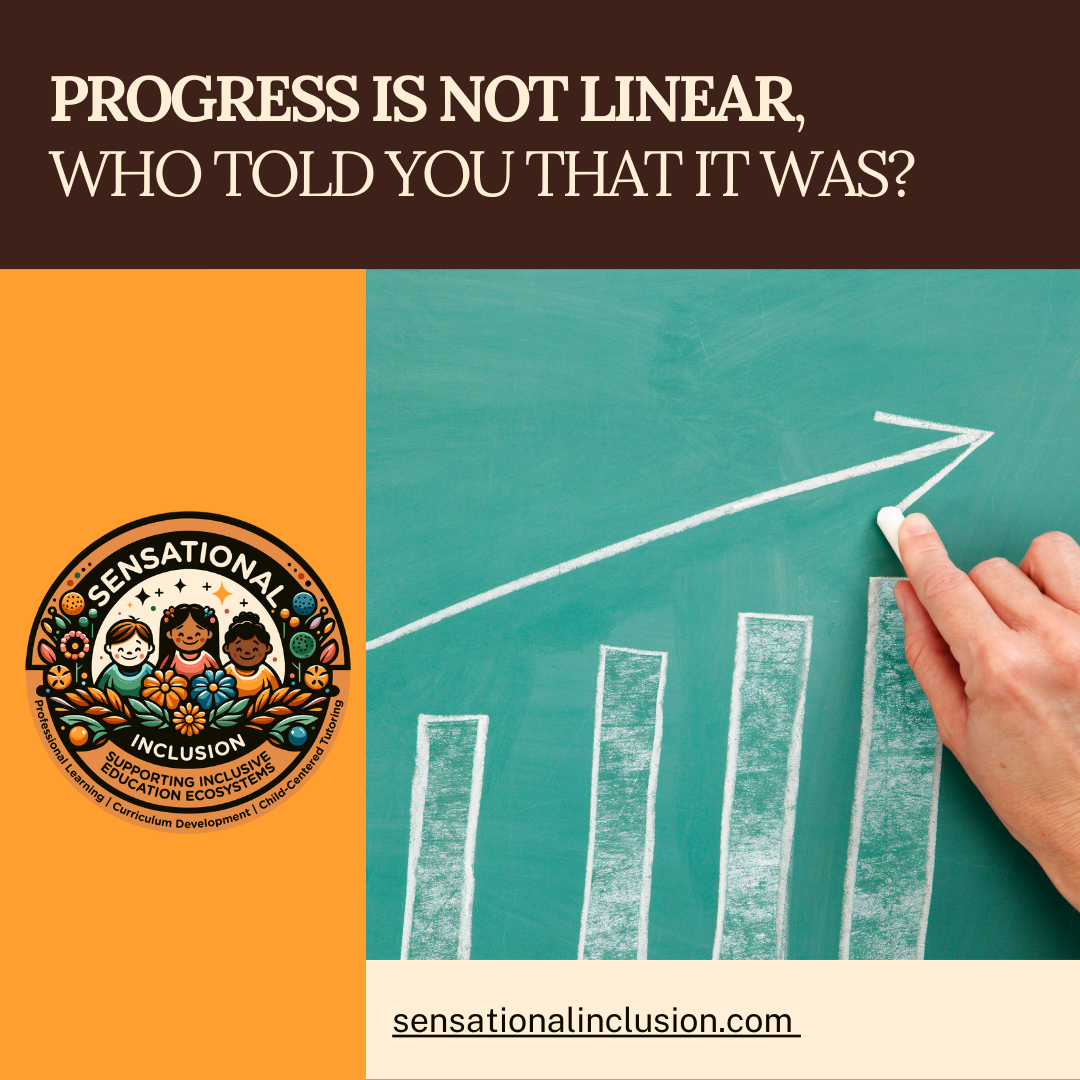We sometimes treat children SO unfairly. I’ve heard so many parents (and teachers) say,, “This kid takes two steps forward and five steps back,” in reference to sensory goals like not hitting, emotional meltdowns, or academic goals. We should challenge this norm and discard the ruler we use to measure, constrain, and agonize over children’s development and growth. Now is an excellent time to ask ourselves when, as adults, have we ever followed a straight line to our goals? Spoiler: we stumble and tumble all the time. Some of y’all be Alicia Keys fallin.
When adults slip up, we often give ourselves a pass, calling it an “off day,” and easily excuse even our more egregious behavior. But what about kids? We’re quick to judge their progress on a linear scale and assess their worth based on how they achieve their goals. Worse, we often do this publicly, while as adults, we spend a great deal of time hiding our mistakes. Adults don’t bring their shopping carts back to the shelter thingy, they vote against human rights issues and sneeze into their hands every single day.. We are still outside doing VERY questionable things EVERY SINGLE DAY.. You can turn on any streaming service and be bombarded with politicians, celebrities, sports players, cult leaders and clergy who have had to conceal repeated risky and often predatory behavior for lifetimes but NBD.
Let’s make it more personal (and less criminal). Almost everyone has had a nonlinear (and nonsensical) love story. How many times have you broken up and gotten back together with someone you knew wasn’t good for you? I’m not talking about the abusive loop that domestic survivors experience (their lived experience is separate from this example), but more like the middle-aged man who still talks about the “good ol days” on his high football team. Yea, like that one…Chances are, your process wasn’t linear. But girl come on…what were you thinking?
If we have to give grace to adults grace when we do flat out wild Sh*!t. Then what do you think we need to give our childs? A WHOLE lot of grace and understanding. Let me help you understand a few things.
It is not Regression: It’s exploration and reorganization.
Why do children sometimes appear to take steps backward in their development? To understand this, we can look at the fascinating world of brain development and memory. The brain is a complex organ, and learning is not a straightforward process. In fact, it often involves twists and turns, much like your relationship with that retired football star.
When it comes to memory and skill acquisition, our brains are constantly forming and strengthening connections, known as synapses. These connections are the foundation of learning. However, this process is not always smooth. Sometimes, as children explore and learn, they may seem to lose a skill they once had. This isn’t regression; it’s exploration and reorganization.
Play in the Pivot
This is where the concept of ‘playing in the pivot’ comes in. It’s about embracing moments when the course changes unexpectedly. In a society that often glorifies a linear path to success – graduate, get a job, climb the ladder – we forget the beauty of the pivot. The pivot is where growth happens, where we learn resilience, adaptability, and the true meaning of progress.
For children, these pivots are essential. They might master a skill and then seem to lose it, but this isn’t regression. It’s exploration, a vital part of their learning process. The child’s journey is a dance of progress and reflection, a series of pivots that shape them into adaptable, resilient individuals.
Our societal critique should not stop at acknowledging these pivots; it should question the rigid structures we’ve created. Why do we box in our children’s potential with standardized milestones and one-size-fits-all benchmarks? Life is a rich tapestry of experiences, not a checklist to be completed in order.
By reframing our understanding of progress, both in children and ourselves, we can start to dismantle these outdated notions. Let’s celebrate the zigzags, the loops, the pivots. These aren’t just deviations from a prescribed path; they’re evidence of a life lived fully, richly, and authentically.
In conclusion, life’s journey, both for our children and ourselves, is not meant to be a straight line but a beautiful, winding road full of surprises and lessons. It’s time we embrace this maze, play in the pivot, and critique the societal norms that push us towards an unrealistic linear progression. Let’s value the journey for its complexity and unpredictability, for that is what makes it genuinely human.

